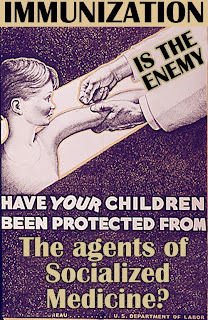Help Me Reach 12 on the Manly Scale of Absolute Gender
If you like the patriotic work we're doing, please consider donating a few dollars. We could use it. (if asked for my email, use "gen.jc.christian@gmail.com.")Thanks!
Sunday, October 14, 2007
Dangers of Socialized Medicine: A More Liberal, Democratic Society
Posted by
Austin Cline
Mercilessly attacking something with the intent of utterly destroying it is something people do to that which they deeply and strongly fear. None but the most profoundly pathological would do this to a minor nuisance or unserious rival. What this suggests, then, is that many conservatives are very afraid of anything remotely like "socialized medicine" in America. The recent attacks on the Frost family are awful, but they are also just the latest in a long series of acts which are part of a larger whole.
It's important to remember that "socialized medicine" here has to be understood very broadly — almost any direct government involvement seems to qualify. A mere expansion of a current government program, for example, looks like the vanguard of socialized medicine to some and thus must be fought as if it were full-blown socialized medicine. I'd like to know why conservatives are so afraid of it, though. Every nation with some form of socialized medicine has its share of problems, but I don't think that there are any which aren't ahead of America when it comes to longevity and general health — so however bad it might be, how can it be worse than what we have?
For the Social Darwinists, socialized medicine might allow the poor and lower classes to live longer, to have children who live longer, and to generally do better in society — or at least better than they should. For the social elitists, socialized medicine might allow the poor and lower classes to get some of the same treatment as the elite — and what good is it being elite if you can't be treated better than everyone else? Socialized medicine sounds like socialism generally, and that just isn't appropriate. Democratic participation in politics is bad enough, but similar democratic involvement in the economy or market just can't be tolerated.
For conservative, evangelical Christians, I think that socialized medicine offers the prospect of institutional, government solutions to social problems. For such Christians, social problems are always a product of individual sin; solutions, therefore, must come from the repentance of those individuals. Once everyone accepts Jesus into their heart then major social problems will be solved — and, I suppose, there won't be any major health care problems. This may sound like nonsense, but it's a basic underlying assumption that informs the evangelical response to most social problems — like race and racism, for example. Institutional solutions are dismissed in favor of personal transformations that turn people on to Jesus and away from sin.
In Europe, it's likely that secularization has proceeded in large part due to the increased involvement of the government in society. Public institutions provide strong alternatives to everything churches do: when people can go to publicly funded resources rather than religious institutions, they can more easily get away from the domination of religious authorities. It's arguable that all forms of purely private charity — not just religious — place people under the control of others in the name of "helping" them.
When it comes to government assistance, however, people receiving assistance are as free as those who aren't — they can criticize the assistance, the government, and the rest of society while still receiving all the same assistance and getting the same treatment as those who keep quiet. If you need help, would you rather get it from an unaccountable religious leader who is only doing it so long as the mood strikes them and who may discriminate against you or others if they don't like the way you look, or would you rather get it from an impartial agency you know is obligated to treat you as well as everyone else?
Don't you suppose that's one reason why the Bush administration has been trying so hard to funnel public money through faith-based programs? It's an attempt to get churches back into the loop so that people have to keep relying on unaccountable, unchecked religious authoritarians for food, counseling, job training, and anything else. Modern liberal democracies have gradually been freeing citizens from having to submit to the power of other individuals — whether in marriage, family, church, corporations, or neighborhoods — in order to go about living their lives.
Some lament the corresponding growth in government power and size, but ultimately it's power which we can all have much more say in than the institutions which have lost power over us. There are legitimate arguments against too much government power, but there are better arguments against the power of institutions which liberal, democratic, representative government has replaced.
Subscribe to:
Post Comments (Atom)


No comments:
Post a Comment
We'll try dumping haloscan and see how it works.